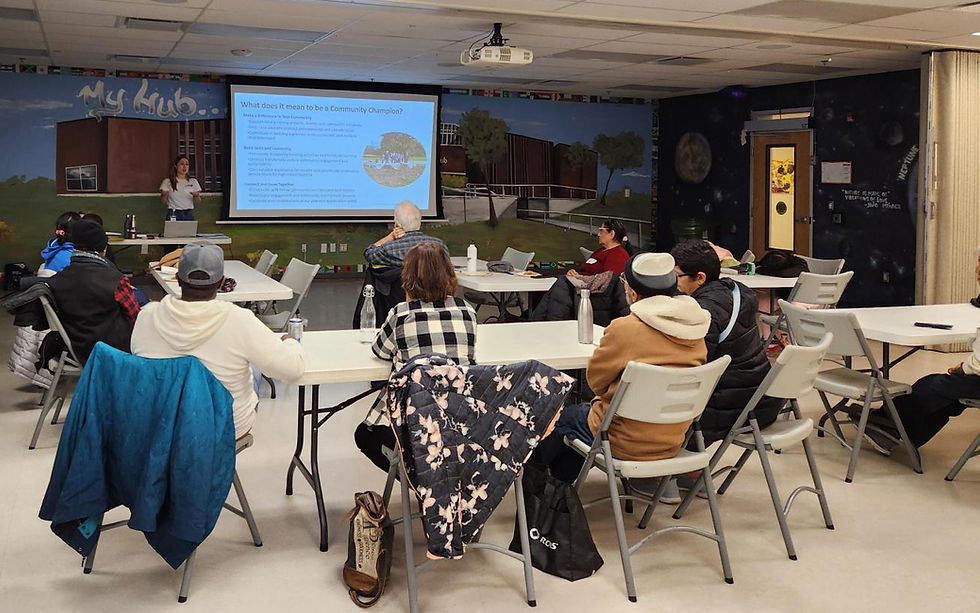Swahili in North Etobicoke: Language, Identity, and Community Connection
- necommunitycluster
- Jul 7, 2025
- 3 min read
by Moses Mwesigwa

Celebrating Kwanzaa in style: African wear, radiant smiles, and symbols of unity and purpose.
Habari! / Greetings!
On July 7, the world marks World Kiswahili Language Day, a UNESCO-recognized occasion honoring Kiswahili’s global importance as the first African language to receive such recognition. This day highlights something familiar to the local community of North Etobicoke: the vital role of Kiswahili as a language of connection, resilience, and cultural pride.
North Etobicoke is home to one of Toronto’s most vibrant and growing Swahili-speaking communities. Rooted in East African cultures including Tanzania, Kenya, Uganda, the Democratic Republic of the Congo (DRC), Burundi and Rwanda, Swahili is more than a shared language. It represents identity, unity, and belonging. Here, it shapes everyday life and community bonds.
World Kiswahili Language Day is celebrated to honor Kiswahili as the first African language with UNESCO recognition, highlighting its vital role in communication, culture, and identity for millions of people across Africa and within the global diaspora.
A Living Language in the Heart of North Etobicoke
Many Swahili-speaking families in North Etobicoke arrived as newcomers or refugees and have built strong roots locally. Swahili remains a vital part of daily communication in homes, schools, and public spaces, bridging generations and preserving traditions. Youth raised in Canada often learn Swahili alongside English, giving them a strong connection to their heritage and a global cultural identity.
Local schools, libraries, and community centers regularly host programs where Swahili is spoken or celebrated, helping youth explore identity, connect with peers, and take pride in their culture.

Learning, Laughing and Living through Stories: Swahili connects generations in North Etobicoke, preserving heritage and identity among newcomer and refugee families.
Community Services that Reflect the People
Community organizations in North Etobicoke have adapted to meet the linguistic and cultural needs of residents by providing services in Swahili not just through interpretation but through programs designed specifically for Swahili speakers. These include:
Community information and referral services in Swahili, assisting with housing, employment, and healthcare access
Youth programs offering mentorship, leadership training, and safe, inclusive spaces
Family support and case management, helping families navigate complex systems
Advocacy for Black students and families in schools, ensuring language is not a barrier to opportunity
For many newcomers, access to services in Swahili means the difference between isolation and empowerment.
If you're looking for local support, consider exploring the Organizations section of the North Etobicoke Community (NEC) website, where you'll find agencies that serve the area's diverse communities including those offering services in Swahili.
Cultural Pride and Visibility
Swahili culture is actively celebrated in North Etobicoke. Traditional East African foods also play an important role in cultural expression, with dishes like pilau, samaki wa kupaka (coconut fish), chapati, and nyama choma (roasted meat) bringing people together at family gatherings, community events, and local restaurants.

Nyama Choma Platter: Authentic East African grilling, bringing North Etobicoke’s community together.
Residents participate in festivals like Afrofest, where Swahili music and dance are featured. Local libraries offer Swahili-language books and story times, and Black History Month programs highlight the community’s contributions.
Kwanzaa celebrations have taken place at Rexdale Community Hub, with the most recent event happening in December 2024. These gatherings feature storytelling, cultural education, and sharing the meaning behind the rituals of Kwanzaa, highlighting Swahili concepts like Umoja (unity) and Kujichagulia (self-determination). They help reinforce the importance of culture and language in building strong, self-aware communities.
Part of a Global and Local Story
Swahili’s global rise in music, film, and social media resonates deeply here. International artists like Diamond Platnumz, Ali Kiba, Sauti Sol, and Jose Chameleone have popularized Swahili and related East African lyrics worldwide. Their music is a staple at community events and among youth, linking local culture to a global movement.

No worries here: The phrase Hakuna Matata popularized by the 1994 feature animation The Lion King, captured with real kings of the savannah.
From The Lion King’s “Hakuna Matata” to screenings at the Toronto International Film Festival (TIFF), Swahili’s presence in global entertainment fosters pride and belonging among North Etobicoke youth.
Conclusion: A Language That Connects and Uplifts
In North Etobicoke, Swahili is more than a language. It is a lived experience that connects generations, supports newcomers, and enriches community life. Supported by local organizations, vibrant programming, cultural traditions, including food, and growing global recognition, the Swahili-speaking community continues to thrive and strengthen Toronto’s multicultural fabric.
Note: “Kiswahili” is how speakers refer to the language. “Swahili” is the English name. They mean the same thing and are often used interchangeably.
Tutaonana baadaye! / See you later!
We’d love to hear from you! Have you celebrated Kiswahili Language Day or connected with Swahili culture here in North Etobicoke? Share your stories or leave a comment below.




Comments